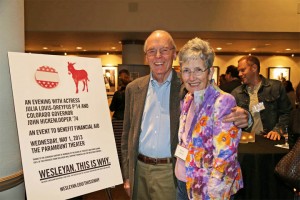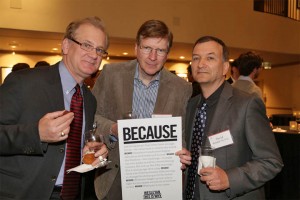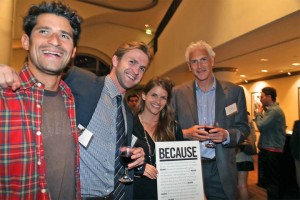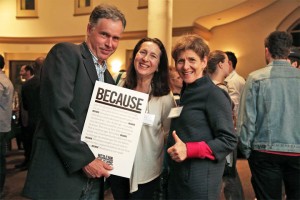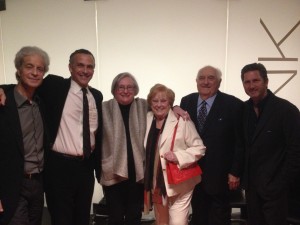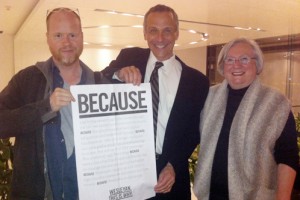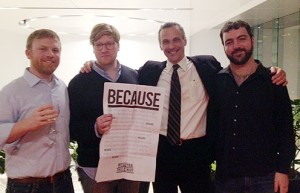On Monday night this week I had a meeting with a coalition of students concerned with how Wesleyan invests the funds in its endowment. This was a follow-up conversation to one started in my office the week before, when a few dozen students staged a protest to call attention to their demands that the university divest its holdings in companies that profit from (1) the prison industrial complex (2) the Israeli occupation of the West Bank and Gaza and (3) fossil fuels. The claim was that these three things are inter-related.
When I asked for clarification about what counted as “the prison industrial complex,” big private prison companies were cited as important examples. I agreed with the protestors that Wesleyan shouldn’t be deriving profits from private prison companies, and that I would argue against any investments in these companies. As it turns out, I was happy to be able to report that we don’t hold any such investments. I would certainly argue against the university taking on such exposure in the future. Some people have a much more general sense of the “prison industrial complex,” which would include major financial, juridical and governmental institutions, and here I’ve not been aware of any divestment argument that successfully navigates such byzantine connections.
I was asked about my view of the Israeli occupation of the West Bank and Gaza. I despair of current conditions and the policies that make for a relentless, tragic grind of human lives. There is intricate political, military and economic work to be done to create the grounds for an equitable settlement for Palestinians that meets the legitimate security needs of Israelis. But I don’t see Wesleyan’s selling stock as being at all relevant to the creation of conditions for peace in the Middle East. Indeed, I think that the call for selling stock is a distraction from the essential policy and diplomatic challenges ahead.
Try as I might, I have a hard time understanding how Wesleyan (and even all universities) selling stock in fossil fuel companies would have any impact on climate change. I have little doubt that climate change is one of the defining issues of our time, but the idea that we would divorce ourselves from energy companies through divestment seems inappropriate given our use of power from these companies every day. Selling our shares of an energy company to another institution or individual will not have a meaningful impact on climate change. Changing the nation’s demand for non-renewable energy would have such an impact. Taxing carbon use and pricing oil and gas in such a way as to account for externalities would have such an impact. Again, divestment seems to me a distraction from the hard work of changing governmental policies, reducing institutional and personal energy use, and developing deep commitments to research on alternative energy sources.
Wesleyan invests its endowment so as to strengthen its economic foundation. This foundation allows us to offer financial aid and to subsidize programs that would not otherwise pay for themselves. While the integrity of every investment professional we work with is crucial for us, we don’t choose investment managers as a vote of confidence in their moral, political or aesthetic views. We choose them because we believe they can prudently and consistently increase the value of the funds we entrust to them. On rare occasions we may say to managers that this university does not want to make money from x. This is not because we think we can disrupt x but because we don’t want to profit from an enterprise creating massive social harm. I wrote about this some weeks ago in regard to the Committee on Investor Responsibility’s report on coal. The students with whom I met in the past week feel strongly that large energy companies are indeed creating massive social harm, and they have interesting arguments. I very much respect their views. We must also recognize, however, that the energy sector is absolutely necessary for our current institutional needs. That’s why I don’t support the posture of separating ourselves from the sector — divesting from our connection to fossil fuels. Instead, I want us to focus on making Wesleyan more sustainable, increasing our use of solar power and reducing our carbon footprint. Arguing in the public sphere for the development of cleaner, renewable forms of energy is also important, and I’m pleased to see so many faculty and students do that so powerfully.
The students with whom I met expressed general concerns about transparency in regard to the endowment. There is actually much information on the investment office’s website, including annual letters summarizing the work of the previous 12 months and the target asset allocation. In addition, the Committee for Investor Responsibility periodically raises issues with the Board’s Investment Committee as it did recently in regard to coal. The CIR website also has important information.
I am sure conversations with various Wesleyan constituencies will continue. They are most productive when organized through the CIR. In the fall, this committee will sponsor a talk by Chief Investment Officer Anne Martin on Wesleyan’s investment policy and operations.
I have learned much from our engaged students, especially when we don’t start off sharing the same view. I know I will be hearing more from them. I will be listening.



